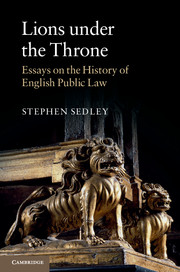Book contents
- Frontmatter
- Epigraph
- Dedication
- Contents
- Preface
- Introduction
- Part I Histories
- Part II Themes
- 6 The royal prerogative
- 7 The sovereignty of Parliament and the abuse of power
- 8 The right to be heard
- 9 The separation of powers
- 10 Public law and human rights
- 11 The state and the law
- 12 Standing and “sitting”
- 13 Law without courts: the tribunal system
- 14 The rule of law
- Index
8 - The right to be heard
from Part II - Themes
Published online by Cambridge University Press: 05 November 2015
- Frontmatter
- Epigraph
- Dedication
- Contents
- Preface
- Introduction
- Part I Histories
- Part II Themes
- 6 The royal prerogative
- 7 The sovereignty of Parliament and the abuse of power
- 8 The right to be heard
- 9 The separation of powers
- 10 Public law and human rights
- 11 The state and the law
- 12 Standing and “sitting”
- 13 Law without courts: the tribunal system
- 14 The rule of law
- Index
Summary
If there are any self-evident truths in public law, one of them is the obligation of every decision-maker to learn both sides of a controversy before coming to a conclusion about it. Centuries of case-law say so; yet the twenty-first century has seen the principle steadily eroded. Are even the most basic principles artefacts of time and place?
“Everyone who decides anything”
Lord Loreburn, born Robert Reid in 1846, became a Liberal MP and in due course Attorney-General. A former supporter of the Boer cause, he became Lord Chancellor just before the great Liberal landslide of 1906, and in that capacity regularly presided in the Appellate Committee of the House of Lords. It was there that he delivered what Professor Wade later christened “Lord Loreburn's epitome” of the right to be heard:
… the Board of Education will have to ascertain the law and also to ascertain the facts. I need not add that in doing either they must act in good faith and listen fairly to both sides, for that is a duty lying upon everyone who decides anything. But I do not think they are bound to treat such a question as though it were a trial. … They can obtain information in any way they think best, always giving a fair opportunity to those who are parties in the controversy for correcting or contradicting anything prejudicial to their view.
Time and place
When it came to the legal status of women, the liberal Lord Loreburn was a dinosaur. In 1918 he moved the unsuccessful amendment which sought to remove from the Representation of the People Bill the section which was to give votes to women, making a speech of historic bigotry in the process. Nine years earlier, sitting judicially, he had held the legal disabilities of women to be so self-evident that
[i]t is incomprehensible … that anyone acquainted with our laws or the methods by which they are ascertained can think, if indeed anyone does think, there is room for argument on such a point.
- Type
- Chapter
- Information
- Lions under the ThroneEssays on the History of English Public Law, pp. 159 - 171Publisher: Cambridge University PressPrint publication year: 2015



